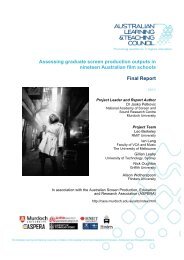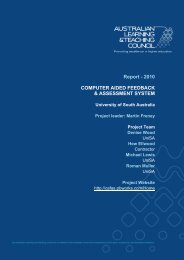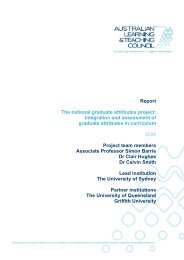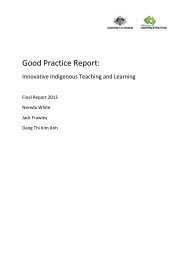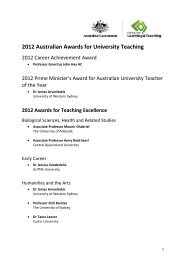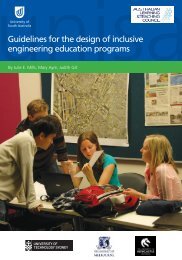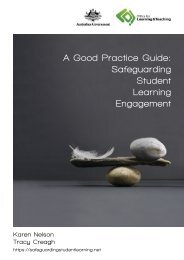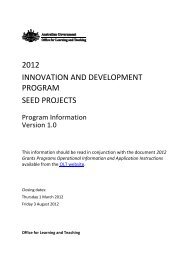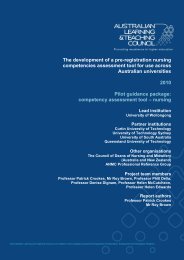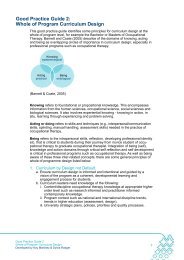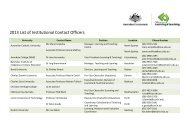national standards for psychological literacy and global citizenship
national standards for psychological literacy and global citizenship
national standards for psychological literacy and global citizenship
Create successful ePaper yourself
Turn your PDF publications into a flip-book with our unique Google optimized e-Paper software.
1. Background of the Fellowship<br />
1.1. Context of the Fellowship<br />
According to Cranney (2010) discipline leaders in psychology have identified two major<br />
issues in undergraduate psychology education.<br />
“The first relates to how the scientist-practitioner model bears on the nature of<br />
undergraduate (UG) psychology education. . . . The second . . . relates to the<br />
delineation, assessment <strong>and</strong> evaluation of academic <strong>st<strong>and</strong>ards</strong>. (p. 3)<br />
In an ef<strong>for</strong>t to address the first of these issues, Cranney, in 2006, successfully applied <strong>for</strong><br />
an ALTC Associate Fellowship that had as its purpose:<br />
<br />
<br />
the development of Graduate Attributes (GAs) <strong>and</strong> their associated Student Learning<br />
Outcomes (SLOs) <strong>for</strong> UG Psychology, <strong>and</strong><br />
the embedding of these GAs into UG Psychology programs throughout Australia.<br />
By the end of this Associate Fellowship, the GAs that Cranney had developed in<br />
partnership with others in the discipline, had been incorporated into the Australian<br />
Psychology Accreditation Council (APAC) St<strong>and</strong>ards (e.g., APAC, 2009; Voudouris,<br />
2009) <strong>and</strong> they are currently evaluated during the APAC site-visit peer review process.<br />
However, as Cranney (2010) acknowledged in her application <strong>for</strong> the current ALTC<br />
Fellowship, the next steps in the further development of an UG Psychology curriculum to<br />
address the two major issues identified above are to:<br />
<br />
<br />
<br />
<br />
“develop guidelines <strong>for</strong> minimum levels of attainment of the SLOs, <strong>and</strong> strategies <strong>for</strong><br />
assessing <strong>and</strong> evaluating that learning.” (p. 3)<br />
“develop a <strong>for</strong>ward-looking, responsible, <strong>and</strong> evidence-based pedagogy <strong>for</strong> UG<br />
psychology, to guide the achievement of Aim 1” (p. 3)<br />
“develop networks of psychology educators, in particular an “UG Network” consisting<br />
of UG program <strong>and</strong> first-year directors from every Department/School of Psychology<br />
within Australia, to facilitate input to <strong>and</strong> engagement with the academic <strong>st<strong>and</strong>ards</strong><br />
<strong>and</strong> pedagogy aims of this initiative. (p. 4)<br />
“couch these activities in continued two-way interaction with relevant inter<strong>national</strong><br />
<strong>and</strong> interdisciplinary bodies” (p. 4)<br />
1.2. Nature of the Fellowship<br />
This Fellowship sought to further develop:<br />
<br />
<br />
academic <strong>st<strong>and</strong>ards</strong> <strong>for</strong> Undergraduate (UG) psychology education, in particular<br />
academic <strong>st<strong>and</strong>ards</strong> <strong>for</strong> <strong>psychological</strong> <strong>literacy</strong> <strong>and</strong> <strong>global</strong> <strong>citizenship</strong>.<br />
a <strong>for</strong>ward looking, responsible <strong>and</strong> evidence based pedagogy <strong>for</strong> UG psychology<br />
education<br />
NATIONAL STANDARDS FOR PSYCHOLOGICAL LITERACY AND GLOBAL CITIZENSHIP 54



